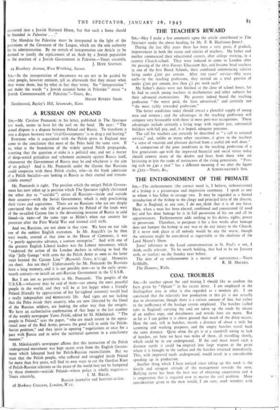THE TEACHER'S REWARD
Sin,—May I make a few comments upon the article contributed to The Spectator under the above heading, by Mr. F. R. Hurlstone-Jones?.
During the last fifty years there has been a very great, if gradual, improvement in both the status and salaries of teachers. My father and mother commenced their educational careers, after college training, in a country Church-school. They were induced to come to London after the passing of the 1870 Forster Education Act, and became head teachers in one of the first Board Schools, their combined commencing salaries being under £3oo per annum. After too years' service—fifty years each—in the teaching profession, they retired on a total pension of under £roo per annum, less than £t per week each!
My father's duties were not finished at the close of school hours, for he had to coach young teachers in mathematics and other subjects for their advanced examinations. My parents indeed found the teaching profession "the worst paid, the least advertised," and certainly not "the most richly rewarded profession."
The better conditions today should attract a plentiful supply of young men and women ; and the advantages in the teaching profession will compare very favourably with those in most post-war occupations. These advantages include certainly a living wage with regular pay, substantial holidays with full pay, and, it is hoped, adequate pensions.
The call for teachers can certainly be described as "a call to national service," and, unlike so many other vocations, it gives to the teachers "a sense of vocation and pleasure derived from a useful job well done.'
A comparison of the poor conditions in the teaching profession of a few generations ago with the improved financial and social status today should remove many of the doubts and fears from those who are hesitating to join the ranks of instructors of the rising generation. "Pass- ing rich on Lao a year" has a different meaning if we alter the figure


























 Previous page
Previous page